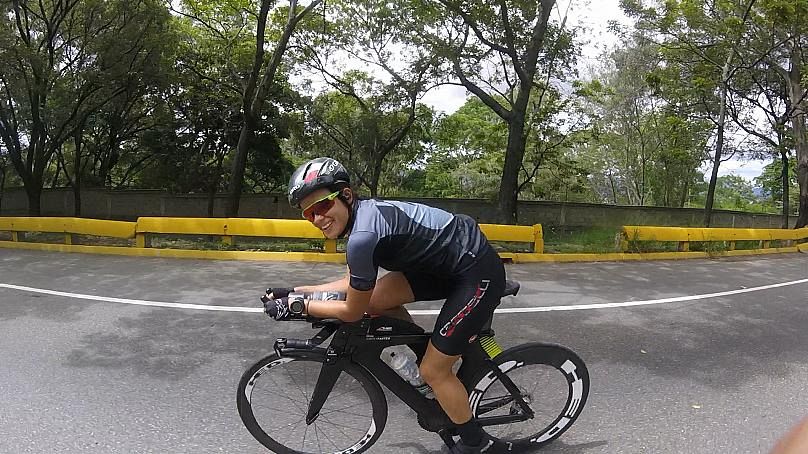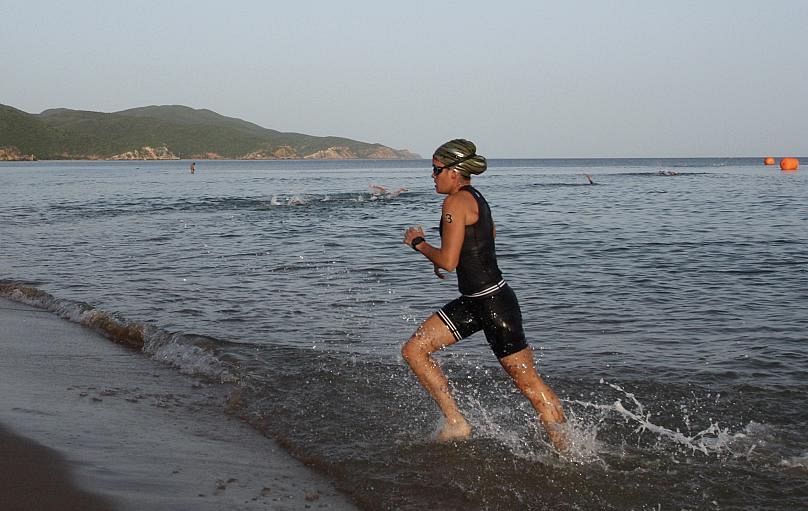From food shortages to cycling on crumbling roads, preparing for the world’s toughest triathlon is not easy in collapsing Venezuela.
From food shortages to cycling on crumbling roads, preparing for the world’s toughest triathlon is not easy in crisis-hit Venezuela.
Even the physical challenge is daunting: Zoe Bello, a Venezuelan native, will have to do a 3.86-kilometre swim, 180 kms on the bike and a 42.2-km run.
But if you include the difficulties of training in a collapsing country, it quickly becomes apparent that just getting to the start line is a feat in itself.
Bello, 22, is set to compete at the Ironman World Championship in Hawaii later this month, a race considered one of the most difficult on the planet.
She spoke to Euronews about the multiple problems she’s faced getting into peak condition for the event.
The scariest is undoubtedly the lack of security on the streets: Bello said she was out on a bike ride when her ex-boyfriend was accidentally shot. She now won’t go out without an escort or support vehicle.
"In the distance between Alejandro and I, I saw how a man on a motorcycle approaches a civilian who is walking down the street and as this happens in front of me, I see how the civilian starts shooting at the bike.
“I went back and hid behind a car and waited for the situation to calm down, and when I got up, I saw that Alejandro had been shot in the leg, he was obviously bleeding a lot.”
But Bello isn’t worried about training in Caracas.
“The best thing to do is rewire your thinking because it’s always the same,” she added. “Here there is insecurity but in other countries, it could be winter. The truth is whenever you have to train, there is an issue.”
Scarcity of basic products are also hampering her efforts.
A lack of chlorine meant a substitute chemical was added to a swimming pool Bello used, prompting a strong allergic reaction.
"I came out with asthma every time I swam,” she said.
Shortages in supermarkets makes it difficult to find many products, including bread, milk, and flour.
But when they arrive, Bello’s mother, Natalia Díaz, is one of the first to know.
"People from the corner store are very enthusiastic about Zoe's preparations,” she said. “When they get bread and flour, they notify me immediately and even reserve these products because they know they are essential for her training."
Other issues include cycling on crumbling roads and finding sponsorship money in a country with hyperinflation.
Despite the challenges, Bello is still able to train and spends around 30 hours a week preparing for the race.
A normal training day begins with 15 kms of running at speed intervals followed by sessions of physiotherapy with muscular electrical stimulation. It ends with swimming, often around 3,000 metres.
A ‘rest day’ is a 2,000m swim and strength sessions in the gym.
Zoe Bello is the sister of Camille Bello, a journalist for Euronews and co-author of this article.













